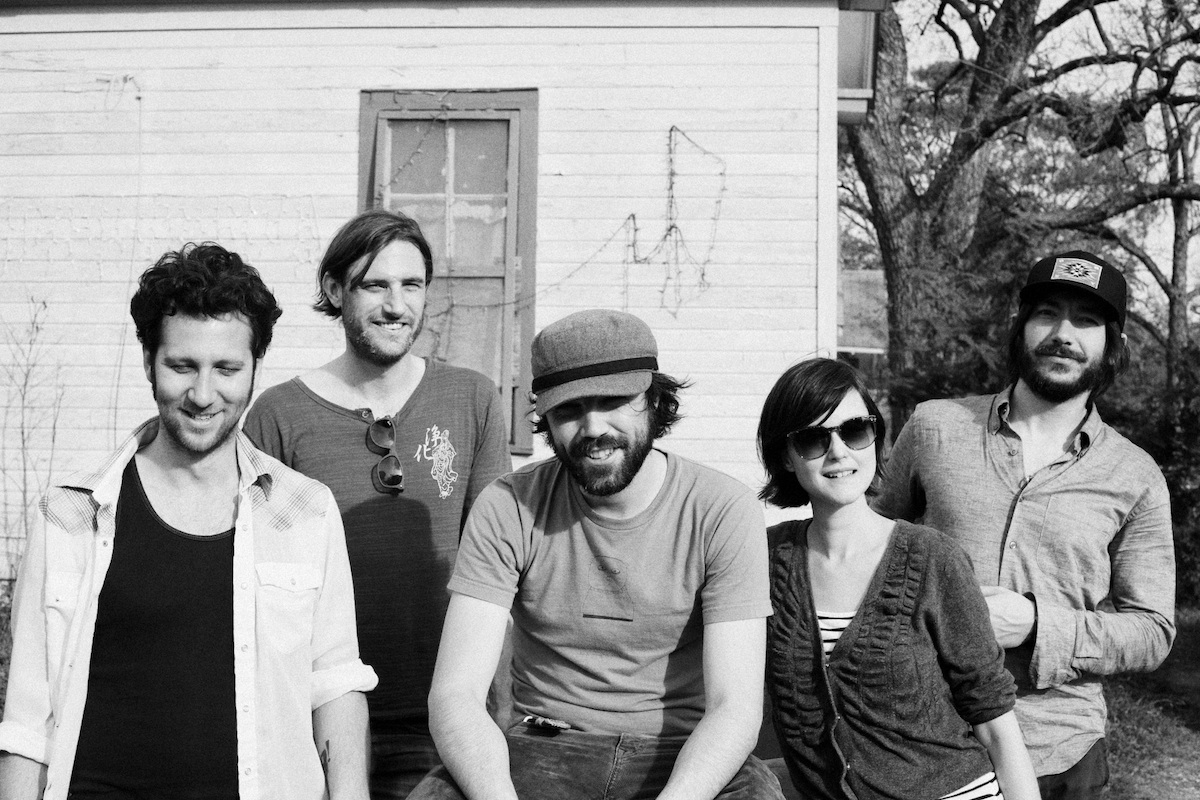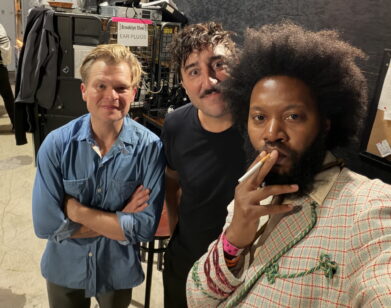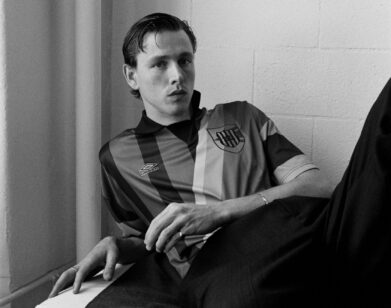Patrick Watson’s Big, Metaphorical Backyard

ABOVE: PATRICK WATSON, THE MAN (CENTER) WITH PATRICK WATSON, THE BAND
Patrick Watson has had a rather eclectic career—the band has toured with James Brown, played with Philip Glass and John Cale, and managed to turn a bicycle into an instrument for the song “Beijing.” Watson’s fourth album, Adventures in Your Own Backyard, is a return to a simpler, more traditional instrumentation—a wispy, optimistic, spring-like folk-pop record. Understated indie the modern, multi-hyphenate way. Unlike their previous albums, Adventures was recorded all in one studio in Montreal, an appropriate setting for this ode to home album.
If you are confused as to why we are referring to Patrick Watson as “they,” it is because Patrick Watson is actually a four-piece band, not a solo artist. Don’t let the single-person name or comparisons to warbling singer-songwriters such as Jeff Buckley and Devendra Banhart, confuse you; members of Patrick Watson include guitarist Simon Angell, and percussion man Robbie Kuster, bassist Mishka Stein, as well as the eponymous Patrick Watson the person (vocals, piano, guitar etc.) Forgive us, Watson fans, if we stated the obvious, but as the below is with Patrick Watson singular, about Patrick Watson plural, it seemed like a necessary clarification to make. Here, Interview talks with Mr. Watson about backyards, soul music, and quiet people.
EMMA BROWN: Hi Patrick, where are you right now?
PATRICK WATSON: I’m in the studio in Montreal.
BROWN: What are you doing there?
WATSON: I come here every day if I’m not working and play piano, play music.
BROWN: Articles about your music always begin with “Patrick Watson is a band, not just Patrick Watson.” Do your bandmates ever get frustrated?
WATSON: In the beginning, it was tricky because we didn’t think we were going to be a band; when we started, [we] were doing multimedia projects. By the time [Patrick Watson] grew into a band, it was difficult to change the name because we had built this name for ourselves. I think over the years, people have realized we’re a band and when they see us live, the musicians really stick out. At this point, I think people are okay with it.
BROWN: So you’ll never be “The Band Formally Known as Patrick Watson”?
WATSON: [laughs] Maybe. That could be fun. We’d tried to find a band name—but that’s another thing, we couldn’t find a good band name that really stuck, that was like, “Wow, that’s great!” For me “Patrick Watson” is an entity now, I almost have to change my name. [laughs]
BROWN: Do you have nickname?
WATSON: No, but I guess I should now that the band stole my name. [laughs]
BROWN: You could be Watson Patrick.
WATSON: Watson Patrick, yes! [laughs]
BROWN: I wanted to ask you some questions about your new album, Adventures in Your Own Backyard. When you were little, did you ever read those nature magazines, Your Big Backyard?
WATSON: No, I’ve never heard of them. What are they?
BROWN: It’s sort of National Geographic for five-year-olds.
WATSON: That sounds awesome. I wish I’d had them.
BROWN: Do you have a backyard?
WATSON: I do now. I didn’t have one for a couple of years because I lived in a loft. [But] a backyard for me is more [being] with the people around you, your friends. I think that’s what defines your home; not your actual, physical home. When you travel a lot, what makes you feel at home is when your friends whom you know really well are there, your girlfriend.
BROWN: I hear you use some rather strange instruments on your albums, something about a bicycle?
WATSON: That was for the last record; we kept it pretty simple with this record. We just wanted to make a bunch of touching songs that really gave us goosebumps.
BROWN: How do you decide which instruments to use on which song—do you write them all on the piano?
WATSON: It’s different each time. We just use the instruments that tell the best story for each song. It’s pretty easy, when you start building a song, you’ll hear it in your head and you’ll know what [instrument] you’ll need to use.
BROWN: I really like your song “Quiet Ground,” can you tell me a little bit about it?
WATSON: You know when you get in an elevator, and there are 20 people in the elevator, but everybody’s dead quiet. You can just hear everybody thinking really loud in the back of their heads because it’s so awkward—the silence—and you’re so curious about what the other 20 people in the elevator are thinking. You have to think of the song kind of like that. [Some people] are not extremely vocal about [their thoughts]—[they] can’t find a way to say it—so they’re like a sleeping parade. The elevator example is how I think of the song; it’s for quiet people to talk. A lot of loud people have been talking over the years; they have these huge voices but don’t say much. I’m sure there are a lot of really quiet people who have a lot more intelligent things to say than the loud people. [laughs]
BROWN: Do you think of yourself as a quiet person?
WATSON: Oh, I don’t think so. I wouldn’t be counted as the most quiet person; I’m not loud either. I have a best friend, the guy who helped me write that song, whom I would consider a quiet person in the sense that [he’s] someone who has amazing ideas, would be an amazing person in this world, but just can’t find his place in it the way it works. He’s on the sidelines and does his own thing, so it’s kind of a waste. [“Quiet People”] is a dedication to the kind of brilliant people whom you just wish you could get to know better. Dedicated to the quiet people.
BROWN: Have you always been making music?
WATSON: Yeah, since I was seven, I guess.
BROWN: What was your first instrument?
WATSON: No, I sang in a choir. I was a choirboy. [laughs] I grew up in a small town, and we had a little church that could fit about 50 people. The guy who ran the choir was this really great, old gentleman who said, “Why don’t you sing in the choir?” And then “I think you should sing a solo!” I was like, “Really, I’ve never sung before.” “Watch, you can do it!” I started taking piano after that. I just remember music always being a part of my life. I was never like, “I’m gonna be a rock star,” or “I’m gonna be in a band.” [It was more] “I just play piano, and I’m always going to play piano. That’s who I am and that’s cool.” I think music became so ingrained in me that it was not even my choice. I do like choral music a lot, the voice is a pretty strong instrument—out of all the instruments, it’s the most intimate. There’s nothing you can do about it, it just feels so good when you hear a bunch of voices sing together.
BROWN: I saw your Spotify SXSW playlist, and you have a song by the Swingle Singers.
WATSON: The who? The Swingle Singers? They put that in there? I dunno, we put a whole bunch of things in there. How funny. All of us pitch in, and we don’t pay that much attention. I guess we should though, I think people take them very seriously. [laughs]
BROWN: What are you most excited for on this album?
WATSON: I’m really excited to go to the States. We’ve spent a lot of time in Europe over the past few years. We really love touring, it’s always a crazy adventure, the high and lows are very spread apart. I think it’ll be the first time that the American audience will get a chance to know us. When you travel, you can see lots of great buildings and monuments and stuff, but the best part of traveling is meeting people as you go. Those are the people who made the places you go to anyway. All my memories of traveling—yeah, there are some buildings or landscapes that I’ll always remember—but I still think I remember the people I meet more than any of that.
BROWN: How do you meet people when you’re traveling—aren’t you busy all day playing shows and unloading/packing up equipment, etc.?
WATSON: Everybody always wants to meet musicians. [laughs] You can go to any random bar around the world and be like, “I’m a musician,” and they’ll have something to say to you. It’s kind of this weird passport where you can go around and as soon as you say you’re a musician, you’re welcome. It’s very difficult for me to travel now without music just because I’m so spoiled. It’s a huge luxury to go and play your music for all these people around the world and having come up to you in a special way—they really want to show your their city, or really want to show you where they are from. If you are just traveling, you don’t get that same welcome.
BROWN: What cities are you playing in?
WATSON: I never check where I’m going to go. When I get in the airplane, it’s fun to see where I end up. [laughs] With touring, there’s always a whole system around you, you can be like a four-year-old—jump in the van and hope for the best! It’s a bit ridiculous. Usually it makes me laugh. I remember one time we were in Europe and we were in the tour bus—and that’s the worst because all you have to do is get back in the bus—I woke up in the morning and walked out of the tour bus, I had my underwear on not realizing I was in the middle of a city, it was 12 o’clock in the afternoon, in Brussels, in the main street. I was like, “Ohhh… why hello, people! What language do you speak?” [laughs]
BROWN: Do the countries all blend together?
WATSON: When you go away for a month on tour, there’s only so much information you can take in. You’re traveling city by city every day. I think five of the 30 days you actually keep with you and the rest becomes mush. And when you get back you’re really mushy.
BROWN: I also wanted to ask you about James Brown; you toured with him once, right?
WATSON: Oh yeah, a long time ago.
BROWN: How was that?
WATSON: That was special. [laughs] The one thing I’ll always remember about those shows is, every time, before we went on stage, he’d get all the lighting and sound guys together, and everybody would have to do a big prayer, they would have to ask to put on the best show of their lives every night. There was this kind of beautiful respect—an inspiring way of taking the stage. James Brown is known for party music, but after touring I had a better understanding of when they say “soul music,” what they meant. It wasn’t party music, it was a very spiritual experience for those musicians; it was about letting go and going somewhere else. I remember being profoundly touched by that. I wouldn’t have expected to have that with James Brown, from what I knew when I was a kid.
BROWN: Do you have a pre-performance ritual that helps calm you down?
WATSON: Yeah, there’s one song I always listen to because it puts me in a good mood, and in people-person mode. It’s Simon and Garfunkel’s “The Only Living Boy in New York,” for some reason the song just calms me down.
BROWN: Is there a song you like to listen to when you’re angry?
WATSON: I hadn’t thought about that. That’s a good question. I’ll pay attention next time I’m angry.
ADVENTURES IN YOUR OWN BACKYARD COMES OUT TOMORROW. FOR MORE ON PATRICK WATSON, VISIT THE BAND’S WEBSITE.






